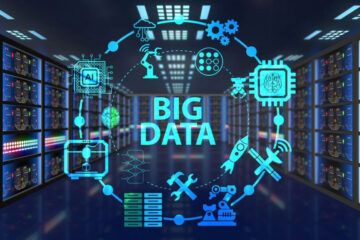Big Data refers to the vast amount of data that is generated every second by businesses, devices, social media, sensors, transactions, and more. This data is so large, complex, and varied that it cannot be easily processed or analyzed using traditional data management tools or techniques. The term “Big Data” is used to describe the size, speed, and diversity of this data, often referred to as the “3 Vs” of Big Data:
- Volume: Refers to the enormous amount of data generated daily. This includes everything from transaction records, sensor data, social media posts, web activity, and more. With the advent of the Internet of Things (IoT), the volume of data continues to grow exponentially.
- Velocity: Describes the speed at which data is being generated and processed. For example, data from online transactions, social media interactions, and real-time sensor data need to be processed quickly for meaningful insights.
- Variety: Refers to the different types of data, such as structured (traditional databases), unstructured (videos, social media posts, emails), and semi-structured (XML, JSON files). Big Data encompasses a wide range of formats that require different processing methods.
The Importance of Big Data
Big Data is important because it provides valuable insights into trends, behaviors, and patterns that can lead to more informed decision-making and better business outcomes. Organizations can harness this data to improve their products, services, and customer experiences, as well as identify new opportunities for growth.
For example:
- In Business: Companies can use Big Data to understand customer preferences, improve marketing strategies, streamline operations, and create personalized experiences. Retailers, for instance, use data on consumer behavior to optimize product placement and improve inventory management.
- In Healthcare: Big Data allows healthcare professionals to analyze vast amounts of patient data for better diagnosis, treatment plans, and even the development of new drugs. It can also be used to track disease outbreaks and predict trends in public health.
- In Finance: Financial institutions can analyze large volumes of financial transactions and customer data to detect fraudulent activity, assess risks, and make more informed lending decisions.
Big Data Technologies
Because of its sheer size and complexity, Big Data requires specialized tools and technologies to store, process, and analyze. Some of the common technologies used to handle Big Data include:
- Hadoop: An open-source framework that allows for the distributed processing of large datasets across clusters of computers. It breaks down the data into smaller chunks and processes them in parallel, which is essential for handling Big Data.
- Apache Spark: A fast, open-source processing engine that can handle real-time data processing. Spark is often used in conjunction with Hadoop for real-time analytics and machine learning.
- NoSQL Databases: Traditional relational databases struggle with the scale and variety of Big Data, which is why NoSQL databases like MongoDB, Cassandra, and Couchbase have become popular for storing unstructured data.
- Data Lakes: A centralized repository that allows you to store all your structured and unstructured data at any scale. Data lakes are designed to handle raw data, which can be processed and analyzed later.
- Cloud Computing: The scalability and flexibility of cloud platforms like Amazon Web Services (AWS), Microsoft Azure, and Google Cloud have made them critical for storing and processing Big Data. Cloud solutions allow businesses to scale resources on demand as the volume of data grows.
Applications of Big Data
Big Data is transforming a variety of industries. Here are some key areas where it has a significant impact:
- Customer Experience: Businesses can analyze customer data to create personalized experiences. By understanding consumer behavior, businesses can offer customized recommendations, targeted advertising, and more efficient customer service.
- Predictive Analytics: Big Data allows for predictive modeling, where businesses can forecast future trends based on historical data. For example, retailers can predict product demand, while energy companies can predict energy usage patterns.
- Real-Time Analytics: Big Data allows organizations to analyze data in real time, enabling quick decision-making. For example, real-time data from sensors can be used to monitor equipment performance and predict maintenance needs, reducing downtime.
- Fraud Detection: In financial services, Big Data analytics is used to detect fraudulent activity by analyzing transaction patterns and spotting anomalies in real time.
- Supply Chain Optimization: Big Data helps companies track the movement of goods across the supply chain, predict potential disruptions, and optimize logistics for cost savings and efficiency.
Challenges of Big Data
While Big Data offers numerous advantages, it also comes with its set of challenges:
- Data Quality and Accuracy: With large volumes of data, ensuring its accuracy and quality is essential. Inaccurate data can lead to poor decision-making and costly mistakes.
- Data Privacy and Security: As Big Data often involves sensitive personal and business information, privacy and security are significant concerns. Businesses need to comply with regulations like GDPR and ensure that data is protected against breaches.
- Integration of Diverse Data Sources: The variety of data types (structured, unstructured, and semi-structured) presents challenges in terms of integration and processing. Companies need robust tools to merge and process data from different sources.
- Data Overload: With so much data available, businesses can become overwhelmed by the sheer volume of information. Effective data management and analytics tools are needed to sift through data and extract actionable insights.
- Skilled Workforce: There is a growing demand for data scientists, analysts, and engineers who have the skills to work with Big Data technologies. Organizations need to invest in hiring or training staff with the necessary expertise.
In Conclusion
Big Data is revolutionizing how businesses and organizations operate, providing them with powerful insights that can drive decision-making, improve efficiency, and enhance customer satisfaction. While it presents challenges in terms of data management and security, the potential benefits of Big Data are enormous, with its applications spanning numerous industries and sectors. By leveraging Big Data effectively, businesses can gain a competitive edge, innovate, and stay ahead of the curve in an increasingly data-driven world.



0 Comments